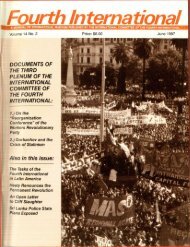Workers League - Behind the US invasion of Somalia - Mehring Books
Workers League - Behind the US invasion of Somalia - Mehring Books
Workers League - Behind the US invasion of Somalia - Mehring Books
Create successful ePaper yourself
Turn your PDF publications into a flip-book with our unique Google optimized e-Paper software.
it was renamed <strong>the</strong> Republic <strong>of</strong> Djibouti.<br />
The new state, formed by <strong>the</strong> union <strong>of</strong> two artificial constructs <strong>of</strong><br />
imperialism, embraced little more than half <strong>of</strong> <strong>the</strong> Somali people. In<br />
1962, Shermarke indicated <strong>the</strong> crippling effect <strong>of</strong> <strong>the</strong> boundaries<br />
which had been drawn by imperialism, saying:<br />
"Our misfortune is that our neighboring countries, with whom,<br />
like <strong>the</strong> rest <strong>of</strong> Africa, we seek to promote constructive and harmonious<br />
relations, are not our neighbors. Our neighbors are our Somali<br />
kinsmen whose citizenship has been falsified by indiscriminate boundary<br />
'arrangements.' They have to move across artificial frontiers to<br />
<strong>the</strong>ir pasturelands. They occupy <strong>the</strong> same terrain and pursue <strong>the</strong><br />
same pastoral economy as ourselves. We speak <strong>the</strong> same language.<br />
We share <strong>the</strong> same creed, <strong>the</strong> same culture, and <strong>the</strong> same traditions.<br />
How can we regard our bro<strong>the</strong>rs as foreigners? Of course we all have<br />
a strong and very natural desire to be united."<br />
The legacy <strong>of</strong> imperialist domination borne by <strong>the</strong> states which<br />
issued from <strong>the</strong> independence process was to prove fatal to <strong>the</strong>ir<br />
subsequent economic and political development. Dozens <strong>of</strong> countries<br />
in Africa and Asia — many <strong>of</strong> <strong>the</strong>m now labeled "failed nations"<br />
by <strong>the</strong> capitalist media and targeted as candidates for recolonizatdon<br />
— became nominally independent without having any <strong>of</strong> <strong>the</strong> prerequisites<br />
for modern life.<br />
<strong>Somalia</strong>, for instance, was a country with no written language,<br />
where education was almost unobtainable, and <strong>the</strong> conditions <strong>of</strong> <strong>the</strong><br />
masses had been maintained at <strong>the</strong> most primitive level. After 7 5 years<br />
<strong>of</strong> colonial rule, <strong>the</strong> country was left without railroads or any o<strong>the</strong>r<br />
significant economic infrastructure.<br />
The domination <strong>of</strong> <strong>the</strong> world market by a few imperialist powers<br />
had long ago blocked <strong>the</strong> path to economic development <strong>of</strong> countries<br />
with far greater resources than <strong>Somalia</strong>. Nor were <strong>the</strong> richer states <strong>of</strong><br />
Africa able to achieve any greater level <strong>of</strong> economic independence.<br />
The more developed <strong>the</strong>ir economies, <strong>the</strong> fur<strong>the</strong>r <strong>the</strong>y were integrated<br />
into <strong>the</strong> world market under imperialist domination. In all<br />
<strong>the</strong>se countries, <strong>the</strong> successive bourgeois nationalist regimes have<br />
demonstrated <strong>the</strong>ir total incapacity to resolve any <strong>of</strong> <strong>the</strong> issues facing<br />
<strong>the</strong> mass <strong>of</strong> <strong>the</strong> population.<br />
This was graphically demonstrated in <strong>Somalia</strong> where, even by<br />
African standards, <strong>the</strong> bourgeoisie was exceptionally weak. At <strong>the</strong><br />
time <strong>of</strong> independence, about 80 percent <strong>of</strong> <strong>Somalia</strong>'s estimated<br />
population <strong>of</strong> three million were nomads. The remainder were<br />
cultivators along <strong>the</strong> sou<strong>the</strong>rn rivers or, between 5 to 10 percent, were<br />
37





